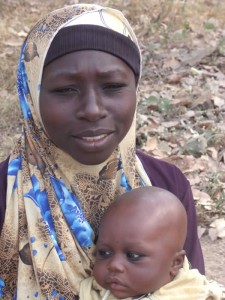By Wasiu Afolabi, Infant & Young Child Nutrition Project in Nigeria
 This week is World Breastfeeding Week, and we have a major reason to celebrate the occasion in Nigeria. My country recently came to a consensus to promote and protect breastfeeding for HIV-positive mothers by adopting the 2009 World Health Organization (WHO) recommendations on infant feeding and HIV. I have high hopes that this decision will prevent the transmission of HIV from mothers to children and save many lives.
This week is World Breastfeeding Week, and we have a major reason to celebrate the occasion in Nigeria. My country recently came to a consensus to promote and protect breastfeeding for HIV-positive mothers by adopting the 2009 World Health Organization (WHO) recommendations on infant feeding and HIV. I have high hopes that this decision will prevent the transmission of HIV from mothers to children and save many lives.
The consensus follows WHO’s international guidance by promoting exclusive breastfeeding for the first six months of life and continued breastfeeding with appropriate complementary feeding for at least 12 months. National nutrition stakeholders and the prevention of mother-to-child transmission of HIV (PMTCT) community worked together to reach the consensus, making sure that national policies will not only aim to prevent transmission of HIV but also benefit the long-term health and survival of our HIV-affected children.
It is a significant achievement because breastfeeding has not been the norm in Nigeria. Despite efforts to improve nutrition behaviors by offering infant feeding support in health facilities and communities, still only 13 percent of mothers practice exclusive breastfeeding for the first six months of life.1 Poor breastfeeding practices contribute to high rates of malnutrition, an underlying cause of Nigeria’s staggering infant mortality rate (75/1,000 live births).1
Part of the problem has been mixed messages about infant feeding that leave health workers and mothers confused. In the absence of consistent national messages, many health workers, worried about mother-to-child transmission of HIV through breast milk, mistakenly advise HIV-positive moms to avoid breastfeeding or to shorten their usual duration. Although replacing breast milk with infant formula or stopping breastfeeding early can reduce HIV transmission, evidence shows that babies face an even higher risk of mortality due to common childhood illnesses like diarrhea and pneumonia.
 I have seen the toll that poor breastfeeding practices can take on communities. In one village in northern Nigeria, deeply ingrained cultural practices led mothers to give babies water and animal milk in addition to breast milk during the first six months of life. Time and time again, more babies in this community became malnourished and sickly compared with children who were breastfed exclusively.
I have seen the toll that poor breastfeeding practices can take on communities. In one village in northern Nigeria, deeply ingrained cultural practices led mothers to give babies water and animal milk in addition to breast milk during the first six months of life. Time and time again, more babies in this community became malnourished and sickly compared with children who were breastfed exclusively.
The good news is that there is now clear evidence that HIV-exposed children can greatly benefit from breastfeeding, as other children have. Exclusive breastfeeding for six months not only reduces the risk of HIV transmission compared to mixed feeding, but it also improves a child’s chances of surviving and remaining HIV free. On the other hand, replacing breast milk with infant formula increases mortality by as much as six times,2 and stopping breastfeeding early can have a three-fold increase on mortality due to other causes.3
This evidence tells us that it is not enough just to prevent transmission of HIV from mothers to babies by avoiding breastfeeding or stopping early. Nutrition and PMTCT policymakers and program implementers in other countries can follow Nigeria’s example by working together to ensure the long-term health and survival of children who are vulnerable to HIV.
Now that we have a clear national consensus, we can fill the gap between the compelling evidence for breastfeeding and the knowledge and practices of health workers and communities. Nigeria’s significant action to protect breastfeeding gives me hope for our mothers and children—and that’s a great cause for celebration.
Learn more about World Breastfeeding Week.
View a summary of current research on infant feeding and HIV.
1National Population Commission (NPC) [Nigeria] and ICF Macro. 2009. Nigeria Demographic and Health Survey. 2008. Abuja, Nigeria: National Population Commission and ICF Macro.
2Kagaayi J, Gray RH, Brahmbhatt H, et al. Survival of infants born to HIV-positive mothers by feeding modality in Rakai, Uganda. PLOS ONE 2008; 3:e3877.
3Kuhn L, Aldrovandi GM, Sinkala M, et al. Effects of early, abrupt cessation of breastfeeding on HIV-free survival of children in Zambia. N Engl J Med 2008; 359:130–141.
Date: Aug 6, 2010 | Category: Points of view
